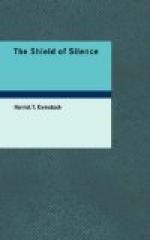The Burke automobile, like a devastating flood, might at any moment tear down the hill to the left. With this fear growing in her a strange perverted sense of justice rose and combated it. She had deliberately put herself in the way of the flood; she knew all about the risks of floods, and it seemed knavish to promise and then—leave the field.
“Better an hour of raging against the absence of me,” she said, pitifully, “than years of regretting my presence. He’ll hate me a little sooner, that’s all. So—good-bye!” Patricia almost ran inside; left a hasty, badly written note, and, metaphorically, scrambled over the disordered path of retreat; she seemed to be racing against that letter on its way to Joan. She would write later to the man who was drawing near. Only one thing did Patricia pause to do: It was like driving the last nail in the old life. She telegraphed to Chicago, accepting the position of designer!
CHAPTER XVIII
“Ours, if we be strong.”
Joan had sung herself into an exalted mood. She had floated along on the wings of music, touching happy memories and tender, nameless yearnings. Her loved ones seemed crowding about her—Doris, dear, sweet Nancy, and pretty Pat. They were pressing against her heart and calling to her.
She began to feel a dull ache for them, a growing impulse stirred deep in her unawakened nature such as always drives the Prodigal unto his Father! The superficial life of the past year seemed husks indeed. It was the beautiful music that mattered and that she could have had with her blessed, safe, loved ones. She need not have left them lonely; she had been shamelessly selfish. Freedom! What was her freedom? Just a tugging against the sweetest thing in life—the false against the true!
Joan felt the tears falling down her cheeks while she sang on—and suddenly it was Patricia who seemed closest to her.
“I will not desert Pat,” she actually sang the words into her song fiercely, resolutely. “Patricia must come into safety with me.”
With this vowed to her soul, Joan dried her tears and sprang to her feet. She had never felt so lonely, so happy, so free as she did that moment when her spirit turned homeward again.
She kicked off her sandals and began to dance about the studio, lightly, joyfully.
The late afternoon was fading into a sudden darkness—a storm was coming; black, copper-dashed clouds were rolling on rapidly, full of noise and electricity; in a short time they would break over the city—but Joan danced on and on!
In that hour not one thought of Kenneth Raymond disturbed her. He belonged to the time of mistaken freedom; he was one who had helped her to think she could make unreal things true. He had no place here and now. She somehow felt that he had passed from her life.
Joan was abnormally young and only superficially old; her experiences had but developed her spiritually—aroused her better self; and in that self lay her womanhood, her knowledge of sex relations; there it rested unharmed, unheeding.




